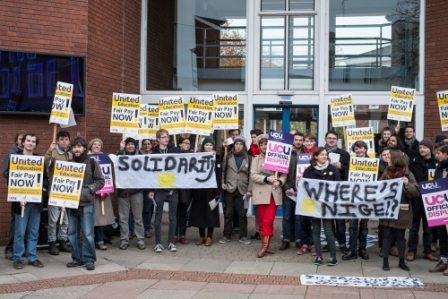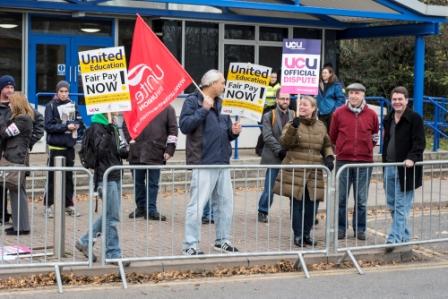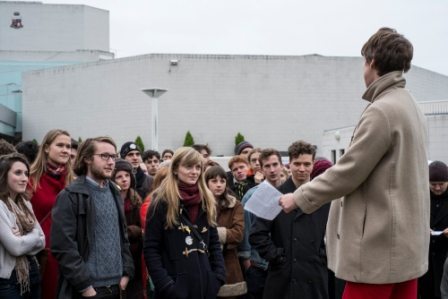Students strike in solidarity with staff
University of Warwick students took part in on-campus demos on Tuesday 3 November to show support for the striking staff.
Students and staff took part in a picket line and demos around campus, organised by Protect the Public University (PPU) Warwick who are protesting against real-term pay cuts for University staff.
A picket line protest was held outside the Gatehouse in the morning followed by a demo outside Senate House which led to an occupation of the Arts Centre Woods-Scawen Room (formerly the ACCR).
Dr Aditya Sarkar, a History lecturer at the University, spoke to the Boar at the demo.
“I was happy that so many students came out in support of us. I am new to the university and had no idea what the strength of the support for a cause like this was.
“I understand that a teachers’ strike must be a difficult issue for many students, and I was thrilled and very moved that there were such a substantial number who understood the importance of mutual solidarity, and came out to support us … they came out and spoke and cheered and shouted, which was great.
“I think there was very definitely a point being made on campus – that there is something sick at the heart of the way the education system is run in this country – that teachers are having [sic] to take a pay cut in real-wage terms at a time when the university’s profits are immense, and that education is being completely commoditised.
“And all this has severe effects – hourly paid staff in this and other universities, for instance, face terrible exploitation, very low wages, and bad conditions of work.
“It was really impressive and heartening that so many hourly-paid staff participated so enthusiastically in these protests.
“Overall these protests show us that despite the unparalleled onslaught on higher education taking place in Britain, there’s still some space for hope.”
An anonymous lecturer outside the occupation told the Boar how Warwick Arts Centre management called campus security to stop the inflow of protesters and that children from a visiting primary school were purposefully positioned to blockade the entrance before the security arrived.
The dispute and two on-campus strikes are part of national action aimed at UCEA (Universities and Colleges Employers Association) which carries out multi-university pay bargaining for participating universities and higher education (HE) colleges. 150 of the UK’s 164 HE institutions are represented in the UCEA.
UCEA have offered a pay increase of one percent on top of “other pay increases” that come from moving up pay bands each year and merit pay awards. This amounts to a total cost of three percent to universities which is “at the limits of affordability and sustainability”.
Only one union, GMB, has accepted the final offer while UCU, UNISON, Unite and EIS are in dispute.
The four unions disputing the offer are asking for pay increases in line with the RPI (Retail Prices Index) rate of inflation – 3.2 percent at the time of the claim – plus a one percent increase.
Universities have said that this is an unsustainable request that would amount to adding over five percent to their costs after considering other incremental and merit pay schemes.
A UCEA spokesperson commented on the recent strikes: “Less than 5% of staff voted for industrial action, so it is no surprise that today’s strike action is similar to the action on 31 October which caused very limited disruption.”
“As the trade unions attempt to string this dispute out, UCEA’s 150 participating HE employers confirmed that the pay increase offered is sustainable, fair and final.
“The trade unions are continuing to press for unaffordable increases that would push pay costs even higher than the 3% already committed, and put jobs at risk.
“Industrial action that tries to damage the student experience is always disappointing to employers. But today the trade union activists are bound to feel disappointed because of the low turnout and insignificant impact across the sector.
“While there has been pressure on real wages across the UK economy during the economic downturn, actual earnings in HE have not seen anything like the decline that the unions are claiming.
“It is perplexing that the trade unions continue to deny the real earnings growth that HE staff have seen over the past decade and to portray any surpluses as if they were a pot of unallocated money.
“Surpluses are vital margins and needed to make up for cuts in capital funding so that institutions can reinvest in high quality teaching and research facilities for students and staff.”



Comments